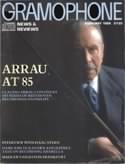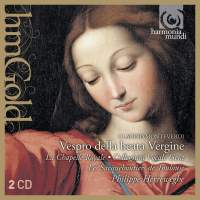Texte paru dans: / Appeared in: |
|
|
Outil de traduction (Très approximatif) |
|
|
Reviewer: David Fallows
Philippe Herreweghe conducts a spacious and flexible reading of Monteverdi 's 1610 Vespers. It is also relatively gentle and soft-edged … He stresses the elegance of the lines, and is particularly good at giving some kind of formal coherence to those movements - "Dixit Dominus" is one of them that contain so much apparently disparate material that they can seem to ramble .
He also follows the latest views in moving to a lower pitch standard for "Lauda Jerusalem " and the Magnificat - effectively transposing them down a fourth . I believe that this must now be accepted as the right thing to do in the 1610 Vespers, though to my ear it brings certain passages into such a low range that the sound is almost laughable; and the only sane solution would seem to be to perform the entire work at a pitch at least a tone higher. But at the same time it is worth saying that Herreweghe is notably successful in matching his musical approach to the extraordinarily low pitch of, for example, the “Et misericordia" of the Magnificat.
In other ways, too, he is up to the moment. He prefers solo scoring to the full chorus (though not as much as Andrew Parrott does on his EMI recording). And he has a liturgically sensible solution to the solo concerti, adding chant antiphons before each of the big psalms.
Further to that, he secures skilled and refined playing from the Saqueboutiers de Toulouse and the Chapelle Royale instrumentalists, he is well in control of his choirs and has some fine soloists, particularly in the two low basses of Peter Kooy and David Thomas.
But there is something bloodless about the performance in general, almost as though it were simply a demonstration of how an up-to-the minute rendering of the Vespers should sound. Part of the problem is that most of the soloists lack passion and conviction. Agnes Mellon seems less at home here than in some other repertories and is occasionally even overshadowed by the second soprano, Guillemette Laurens . Howard Crook in the all-important tenor solos fails to compel and simply sounds uninteresting - though again everything is adequately done . Less well done is the amazingly fussy harpsichord playing that all but destroys the beautiful "Nigra sum" and brings " Pulchra es" virtually to a standstill with its unlovely clunkiness.
The recording itself leaves much to be desired: balance is often musically confusing, and there are several places where I cannot hear some of the inner voices at all - in fact , were it not for Herreweghe's reputation for fastidiousness I would swear they had simply been left out. I hope it is not turning the knife too strongly to add that the accompanying booklet is also unsatisfactory, with information on the banding buried near the back and with an explanatory essay that does nothing to help understand this particular performance (that is, nothing on the controversial matter of pitch, nothing on what went into the difficult decisions on scoring, nothing to suggest to the unwary than the plainchant additions are editorial hypothesis with no direct authority from Monteverdi).
There is
nothing really wrong with the recording; whereas each of the comparisons listed
above has, to my ear, some real problems. But I prefer all three to Herreweghe;
and, to shortcut a long discussion, I prefer them in the listed order (the
Corboz and Harnoncourt are, by the way, available on Erato and Teldec/ ASV
respectively), though most readers would probably want to put Parrott at the
head of their list. |
|
|
|
|
|
Cliquez l'un ou l'autre
bouton pour découvrir bien d'autres critiques de CD |
|




